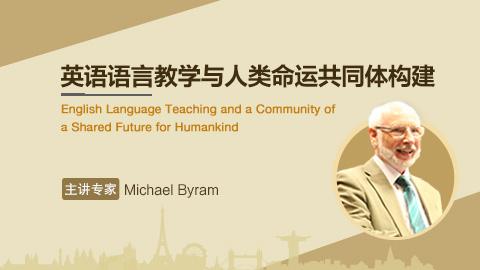英语语言教学与人类命运共同体构建
Overview
1. what does a community of shared future for hunmankind mean?
2.Creating a shared community- an example in an experient?
3.The meaning of the experment for everyday teaching/learning?
Community of a Shared Future for Hunmankind
>keywords and meanings=“shared” and “community”
>Community and "belonging"-2 kinds of community experienced and imagined
>Experienced community-wher everyone knows everyone=village life
community created by personal direct
interaction/communication
>BUT-always exceptions - some individuals remain on the edges
>Imagined community-where nobody knows everyone but still belong together=national life (and/ city regional life)
>Everyone knows SOME NUT NOT ALL directly / personally BUT OTHERS knows indirectly
>Community created by institutions: school where everyone learns ‘the same’; media(natioanl/regional television,newspaper etc.)where everyone learns “the same”
>International communication with other pepole of “our nation” is indirect
>But -always exceptions-some individuals or groups remain on the margins
Community and Identity
>Experienced and imagined communication creat identities.
>I am a person from village A
Michael Byram - no villege
>I am a person form city B
I am Michael Byram from Dewsbury - I read the Dewsbury Reporter(newspaper)
>I am a person form region C
I am Michael Byram from Yorkshire - I watch the Yorkshire television
>I am a person form nation D
I am Michael Byram from England - I watch the BBC
What is shared"
>Culture=behaviours,values,beliefs
>"in our village we all help each oher in the harvest"
>Because we believe it is more effective
>Because we value cooperation(no competition)
>In our nation we all obey the laws
Because it is the effective way of living together peacefully
Because we value living together not living as isolated individuals.
Community of Humankind
>Meaning?
>Belnging to an imagined community of all hunmankind
>Knowing some but not all AND knowing some beyongd naton
>How to create?
No world media(yet?)
Get to know some people beyond nation--THROUGH LEARNING A FOREIGN LANGUAGE
An example
>Purpose of language teaching in this example:
>To create experience of a shared community beyond the national xommunity
How?
>By getting to know SOME people in another country
>What is "getting to know"?--3 conditions for seccess
--Makiing contact
--Having a common task/purpose
--Supported by insition i.e. school
BUT only "contact' is not enough
Green Kidz project
Green Kiz: Young learners angage in intercultural environmental citizenship in English language classroom in Aregentina and Denmark.
Melina Porto,Petra Daryai-Hansen,Maria Emilia Arcuri and Kira Schifler
In:Byram,Golubeva, Han and Wanger(eds) Education for Intercultural ccitizenship-Principles in Practice. Multilingual Matters(forthcoming)
Particcipants and aims
Learners in Argentina and in Denmark - learning English (ages 10-12)-connected by internet
Aims:
THINKING
>encouraging children to explore and reflect on environmental issued - globally and locally
>understand environmental issues and how to recognize them in their own surroundings
>challange taken-for-granted represenations of the environment.
ACTING
>engage in trash sorting and recyclling practices
>contribute to improving the environment in their local sommunities=ACTIN IN THE COMMUNITY
Activities
STAGE 1- DSCOVER ABOUT "US" NAD PREPARE FOR "THEM"
>Pupils identified green crimes in their schools and in their sommunities and drew or video-taped these crimes.
>trash analysis listing, classifying and sorting trash in waste bring in schools
STAGE 2 - PRESENT "US" TO "THEM" AND COMPARE
>xompared and discusssed results using a wiki
>survey among family members, friends,etc. about their enviromental habits-ccompared on wiki
analyzed critically(audio) visual media images and texts, produced in Argentina and in Denmrk
--SOCIAL IDENTITY=
"We Danes and You Argentineans"/"wee Argentineans and you Danes"
STAGE 3 - WORK TOGETHER - IN "US AND THEM" GROUP-NEW"WE"GROUP?NEW IDENTIFICATION
>collaboratively online using skype and wiki (i.e.Argentinean and Danish pupils in mixed groups)designed advertisements to raise awareness of environmental issues.
---NEW IDENTTY="We global citizens"
Using the internet to share understanding
Action in the community
STAGE 4-FOUCUS AGAIN ON "US" AND ACTING...
Selection of actions by pupils:
- (A)created vidoes and songs and shared in facebook page
- (DK)wrote to local newspaper and posted informaion on Facebook.
- (A)were interviewed by a local journalist and got the collaborative posters published in local newspaper
- (DK )produced a final youtube video(youtube.com/watch?v=3CRboXq2yZs)
- (A)designed a "pasacalles"(banner) and hung in the school street
Changed identity=
'We Argentineans with global citizenship'
'We Deans with global citizenship'
Methods and Shared Values of Humankind
- stimulate curiousity about others----Respect for others is important
- Collaboration as 'new WE' --Cooperating with others is important
- Action in the community--Helping others is important
The Meaning of the Experiment for 'Ordinary' Teaching/Learning
- project work=10-15% of time BUT effect is 80%----try to link with let in other Asian (ASEAN) countries
- BUT project combines(1)'teaching our chulture' with (2)'teaching intercutrural competence' and (3) 'citizenship education'
- Teaching our culture=
>Using texts in English about China
----for reaading skills, for speakiing and listening skills
2.Teaching intercutural competence
>Telling pepole from other countries zbout China OR my village/city/region
writing/speaking skills--write a text in English about (some aspact of) village/city/region/china; prepare an oral presentation about (some aspect of) village/city/region/China
3. Citizenship education
> connect the classroom to the experienced community
--learners prepare exhibitions of work for other learners
--learners invite parents/local journals etc. to exhibitions
Once per year.....
10% of time 80% of effect!
Conclusion
- Is this language teaching? YES, because...
- Language learning is more effective when language is used not studied
=focus of attention is on content not language
- Language teaching is both instrumental and humanistic:
--课程性质:
--大学英语课程是高等学校人文教育的一部分,兼有工具性和人文性双重性质。就人文性而言,大学英语课程重要任务之一是进行跨文化教育。
Q&A:
In a way or in a sense as linguistics can think about what we do, think about how we can present what we do to others, interact with others, creat a contact grop, give that contact group a common purpose over a period of time and then let them think and then they will be interested also to evaluate how their identities change through that kind of common purpose work together weather there are western medicine or Chinese medicine students. I think that is what I can do.


